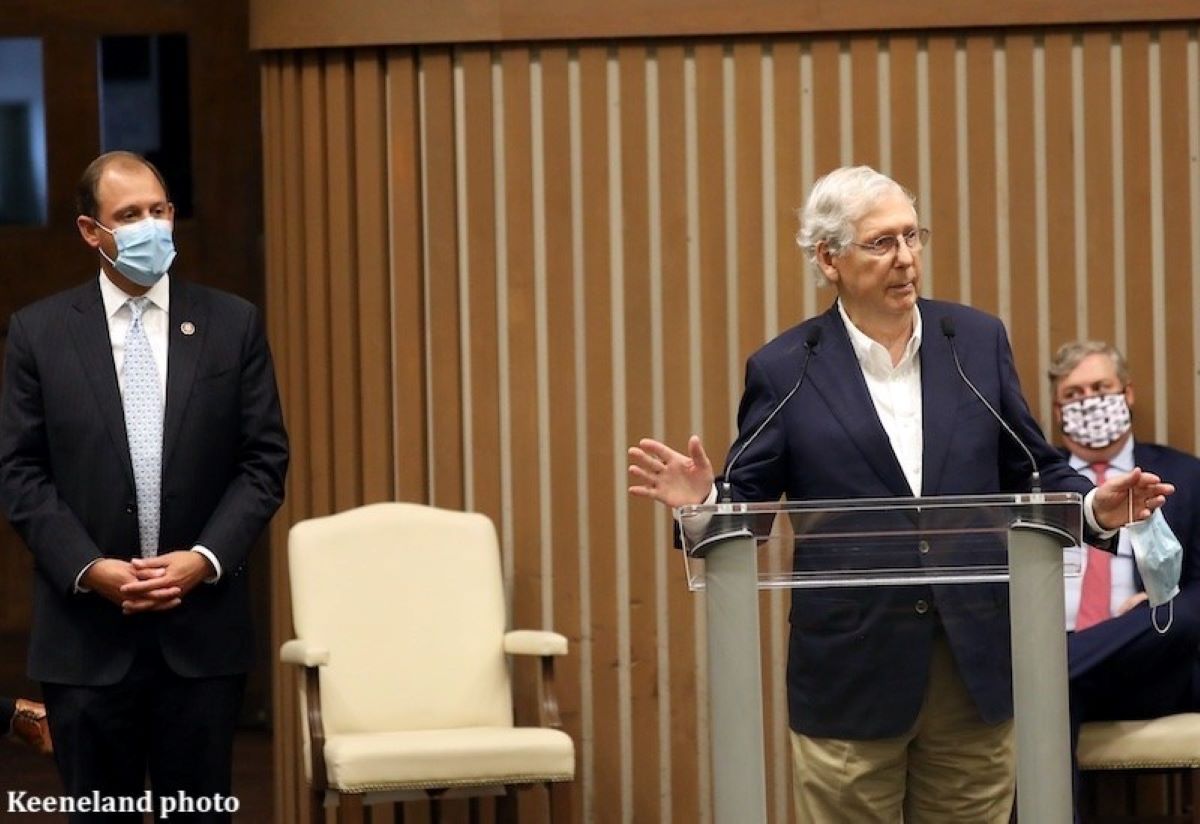The Horseracing Integrity and Safety Act, a bill once thought dead, passed in the US Senate late Monday night, taking up a small part of a $1.4 trillion government funding bill that included $900 billion for COVID-19 relief.

President Donald Trump is expected to sign the bill, which the House of Representatives passed with bipartisan support this fall. When he does, horseracing will take a tentative first step toward national drug testing and a broader national structure. The sport notoriously lacks consistency in both.
“I’m proud the Senate agreed to my legislation to preserve our signature racing industry,†Senate Majority Leader Mitch McConnell (R-Ky.) said in a statement. “With the leadership of Congressman Andy Barr and the partnership of sport leaders, horse advocates and fans, we’re one step closer to promoting fairness and safety across Thoroughbred racing.â€
McConnell championed the bill, along with Barr (R-Ky.) and Congressman Paul Tonko (D-NY). They had plenty of company among the sport’s power elite. The Jockey Club led a high-powered industry lobbying effort that included the National Thoroughbred Racing Association, the Breeders’ Cup, the New York Racing Association, The Stronach Group, the Del Mar Thoroughbred Club, Churchill Downs, and Keeneland.
NTRA, Jockey Club Celebrate Bill’s Passing
“We look forward to President Trump signing the HISA into law and by doing so, commencing the establishment of an independent and well-informed central authority that will ensure the integrity of our sport and the safety of our human and equine athletes nationwide,†said Alex Waldrup, president and CEO of the NTRA in a statement.
“With the passage of this bill, we restore confidence with our fans that the competition is clean, the game is fair, and the horse and rider are protected,†The Jockey Club Chairman Stuart Janney III said in a statement.
The HISA, which took up 64 pages of the omnibus spending bill, won’t take effect until July 1, 2022. That date institutes the formation of a “Horse Racing Integrity and Safety Authority†that will take responsibility for creating an anti-doping and medication-ending program. A nine-member board will oversee that Authority.
HISA Brings USADA’s Anti-Drug Ruthlessness to Horses
When HISA takes effect, the United States Anti-Doping Agency will take over drug testing and enforcement from the individual state racing commissions. The Authority plans to standardize safety and medication policies nationwide. That’s a break from the individual state fiefdoms that ruled the sport for decades.
Plans include phasing out Lasix, a process already in place in several states across the country. Horses won’t be allowed its use for next year’s Triple Crown races. And horses running Kentucky Derby prep races must be off the anti-bleeding medication to earn Derby points.
While all of this sounds good – and necessary — for the sport, one glaring omission remains. There is no language describing where funding for USADA and the authority will come from. According to the bill, initial funding will come from loans to the Authority. Eventually, the same states who just had their authority over the sport kneecapped by this bill will likely be on the funding hook.
Some Industry Groups Opposed to HISA
Not every industry group is in the saddle with this bill. The US Trotters Association, which represents harness racing and Standardbred horses, opposed the bill when it was unveiled in the fall. It claims the bill “is a Thoroughbred bill written by elite Thoroughbred interests in an attempt to address elite Thoroughbred problems.â€
The USTA echoes the National Horsemen’s Benevolent and Protection Association’s issues with the lack of veterinarian oversight on drug testing. The NHBPA is the strongest critic of HISA, especially on the banning of Lasix.
“This bill mandates a drug-testing authority that has no background in animal testing. The testing authority will be done by a private business – USADA – which tests certain human athletes,†the USTA release read. “Nowhere in the bill is there mandated ANY consultation requirement with the National Veterinary Service Labs for drug testing or the USDA Veterinary Services.â€









